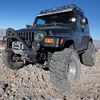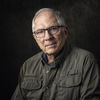flash output
Nov 19, 2012 07:28:07 #
I recently took instruction from a photographer who helped me with flash photography. What stumped us both was the differing results of noise in the images when we both had the same settings in camera. We both have a Canon 60d, she had a 24-70 2.8L, 580 ex speedlight. I had a sigma 17-50 2.8 EX & Canon 70-200 f/4L with 430 ex ii. We were toying with Higher ISO and her images didn't need the extra push of ISO like mine. Her images, even at the same ISO etc rendered less noise. Is it because her flash is more powerful?
Nov 20, 2012 14:10:30 #
redpepper wrote:
I recently took instruction from a photographer wh... (show quote)
It's impossible to say without being there and seeing the exact setups. The different glass can make a difference and so can filters.
It could be the flash if you were beyond the limits of the 430 flash and your friend was within limits of her 580 flash. The 430 and 580 model numbers are indicative of the maximum distance in meters the flash is capable of i.e. 580 = 58 meters and the 430 = 43 meters. When you set up your identical shots you should have noted the distance in feet/meters indicated by the flash to see if both were the same and if you were within range.
I would have compared focal length settings, f-stop, shutter speed, ISO and guide number on the flashes. Other settings in the camera body can also make a small difference in outcome.
Nov 20, 2012 14:40:24 #
Thanks Jeep daddy for responding. I did notice she had no filter on her glass and I have a b& w multicoated on mine. ISO, shutter and f stop were the same. Our focal lengths were the same, as well as subject distance (I believe the subject was 20 ft from camera). So it might just be the filter.
I will try some shots w/o filter and see. Thx again.
I will try some shots w/o filter and see. Thx again.
Nov 20, 2012 15:13:51 #
redpepper wrote:
Thanks Jeep daddy for responding. I did notice she had no filter on her glass and I have a b& w multicoated on mine. ISO, shutter and f stop were the same. Our focal lengths were the same, as well as subject distance (I believe the subject was 20 ft from camera). So it might just be the filter.
I will try some shots w/o filter and see. Thx again.
I will try some shots w/o filter and see. Thx again.
I will guarantee you 100% the filter had nothing to do with it assuming it was a UV and not a polarizer. Where does this come from that a UV filter will affect exposure??
Nov 20, 2012 15:17:43 #
You were comparing appels and oranges. No way can you draw valid conclusions that way! All tests should be done on the same camera, lens (without filter), ISO, distance, subject and all the settings on camera and lens.
Nov 20, 2012 16:13:46 #
You're right Kravis, all factors weren't the same. A stupid question on my part.
Nov 20, 2012 18:48:39 #
Brian in Whitby
Loc: Whitby, Ontario, Canada
The amount of noise depends on ISO, Exposure time, temperature and the make/model of the sensor. Were all of these factors the same? Other factors might be in camera noise reduction or some other variable I have not thought of.
Filters and lenses will not affect the amount of noise but the exposure variables might be affected by the field of view. for example how much background is in the photo.
Hopefully your 'experiment' was carried out in manual mode so you were not at the mercy of auto mode.
In a controlled experiment, you keep ALL the variables exactly the same except for the one you are testing. In this case the cameras.
Filters and lenses will not affect the amount of noise but the exposure variables might be affected by the field of view. for example how much background is in the photo.
Hopefully your 'experiment' was carried out in manual mode so you were not at the mercy of auto mode.
In a controlled experiment, you keep ALL the variables exactly the same except for the one you are testing. In this case the cameras.
Nov 20, 2012 20:12:54 #
CaptainC wrote:
I will guarantee you 100% the filter had nothing to do with it assuming it was a UV and not a polarizer. Where does this come from that a UV filter will affect exposure??
redpepper wrote:
I will try some shots w/o filter and see. Thx again.
I will try some shots w/o filter and see. Thx again.
I will guarantee you 100% the filter had nothing to do with it assuming it was a UV and not a polarizer. Where does this come from that a UV filter will affect exposure??
Captain, nobody said anything about UV filter. I just said 'filter'.
I ran a similar test with a friend of mine to see why our camera settings weren't agreeing with each other. Even though he was shooting a Nikon with a 500mm f4 lens and I was shooting a Canon with a 500mm f4 lens, I felt we should have been shooting at about the same f/shutter/iso but he was shooting at a higher iso. A day or two later my friend discovered that he lens had a CP drop in filter and didn't know it. He had just purchased his lens used and hadn't used it but a day or two.
Nov 21, 2012 00:00:37 #
jeep_daddy wrote:
quote=CaptainC quote=redpepper br I will try so... (show quote)
Yeah, I know. That is why I said "assuming it was a UV..." Nobody in his right mind just keeps a CPL on (or dropped in) a lens as a matter of course. Yet I have seen time and again here people suggesting a UV filter will affect exposure, which of course, is pure BS.
Nov 21, 2012 02:36:16 #
Compare your Custom Funtion settings such as High Iso noise reduction and Long exposure Noise reduction
Nov 21, 2012 06:22:52 #
That was it...the long exposure noise reduction was enabled and affected high ISO. Problem solved. Thanks so much.
Nov 21, 2012 19:59:26 #
redpepper wrote:
That was it...the long exposure noise reduction was enabled and affected high ISO. Problem solved. Thanks so much.
Hmmmm!! I would have put money on High ISO. Also be aware that both of these setting will drasticly slow down burst rate if activated or set too strong. Glad to help.
If you want to reply, then register here. Registration is free and your account is created instantly, so you can post right away.




